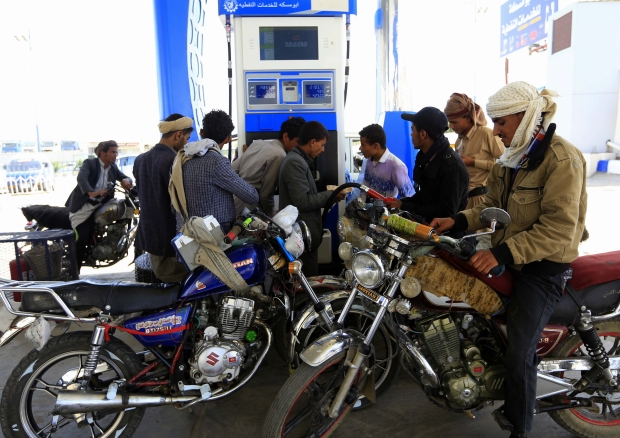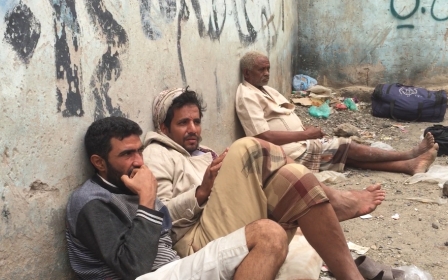Sanaa fuel crisis: Hodeidah siege cuts supplies as traffic grinds to a halt

SANAA – Despite the threat of Saudi bombardment, the streets of the Yemeni capital Sanaa have retained much of their character throughout the three-year war.
Vehicles choke the streets, taxi drivers lock in heated exchanges and horns blare at junctions.
But not anymore.
A crippling fuel crisis has descended over the Houthi rebel-held city, leaving thousands of drivers and passengers stranded or severely out of pocket.
Sami Abu Bakr, 33, used to take a bus from his house to work for 100 Yemeni rials ($0.60). But during the last couple of days that fee has doubled, and he now has to shell out 200 rials for the same trip.
Before the civil war broke out in 2015 – pitting the Houthis against the government of Abd Rabbuh Mansour Hadi, which is backed by a Saudi-led coalition – Yemen was already the poorest country in the Arab world.
That situation has only intensified during the conflict, with the United Nations labelling Yemen the world’s worst humanitarian crisis and NGO Save the Children on Wednesday warning five million children are at risk of famine.
Abu Bakr fears this latest rise in fuel prices will only compound Yemenis’ misery, as he cannot now afford to pay for transportation and feed his family.
"I have resorted to going to work by bus and return to my house on foot because my salary is not enough to pay for transportation", Abu Bakr told Middle East Eye. "I have already had to deprive myself and my family of many things and now the new fees have forced me to walk."
Though his commute takes just 15 minutes by bus, the journey on foot can take up to an hour.
"As a resident I do not know who stands behind the fuel crisis but I know that civilians are the victims of all crises in Yemen and there is no one to help them," he said.
Reasons for fuel crisis
A source in the state oil company in Sanaa told Middle East Eye that there are several reasons behind the current fuel crisis, promising it will be solved soon.
"The increase of the dollar against the [Yemeni] rial and the battles in Hodeidah are the main two reasons behind this crisis," the source said, on condition of anonymity because he is not authorised to speak to media.
The fear of the future leads people to store fuel in their houses and this also aggravates the crisis
- Oil company source
Yemen’s currency has lost half its value since the war erupted in 2015, and has gone into freefall in recent weeks, driving up prices of all manner of essential goods in the country.
Meanwhile a pro-government assault on the Houthi-held port city of Hodeidah, where as much as 80 percent of Yemen’s imports arrive, has created further shortages.
"Traders buy dollars for more than 620 rials from the black market, and there are threats that the battles may target [fuel] trucks in Hodeidah, so they are wary of importing fuel amid those battles," the source said.
However, a recent flare-up on the Hodeidah front has calmed somewhat, which the source said will allow traders to import more fuel and help ease the crisis.
According to the source the crisis has also been exacerbated by Yemenis panic buying petrol instead of only taking what they need at the time.
"The fear of the future leads people to store fuel in their houses and this also aggravates the crisis," he said.
Officially, no fuel can enter the north from government-controlled areas as it will be stopped at checkpoints. However some is smuggled via the mountains.
Empty tanks
Across Houthi-controlled areas of Yemen, which include most of the country’s west – including the capital Sanaa – petrol stations lie empty.
Fuel supplies, and their prices, are controlled by the black market. And when petrol stations do have fuel to sell, it sells out in less than an hour.
Before the crisis started to bite earlier this week, 20 litres of fuel used to cost 8,000 rials. Now that has risen to 16,000, with prices on multiple goods and services reliant on fuel doubling as a result.
Deliveries of water, which many Yemenis rely on, now cost 7,000 rials for a truckload of 1,000 litres, up from 4,000. Even the size of loaves of bread has decreased.
I do not know who stands behind the fuel crisis but I know that civilians are the victims of all crises in Yemen and there is no one to help them
- Sami Abu Bakr, Sanaa resident
"Everything has increased in price, while our salaries have stayed the same since 2011," Abu Bakr said.
While average Yemenis are struggling to adapt to the new situation, Houthis and the wealthy are suffering no such problems.
When it comes to accessing fuel if and when it arrives, the Houthis always have priority. Wealthy Yemenis, meanwhile, can turn to the black market to source what they need.
"I think they [black market salesmen] buy it from petrol stations in secret and sell it for double the price,” Abu Bakr said.
Though fuel flows much more freely on the black market, the demand there is enormous too, and as a result sellers can impose any price they want with no regulations.
Snaking queues
On Tuesday, the state oil company in Sanaa issued a list of 20 petrol stations set to sell fuel for 9,000 rials per 20 litres on Wednesday.
Desperate not to miss the chance to buy reasonably priced fuel, hundreds of owners of cars and motorcycles slept in the streets outside the petrol stations to secure their place in the queue.
When the petrol stations opened on Wednesday, however, they were only able to sell fuel for a few hours before closing due to a shortage of supply.
Najib al-Maswari, 49, spent Tuesday night asleep in his car, in a line of hundreds of vehicles queueing up to buy fuel. Despite his precautions, Maswari’s attempts to buy petrol were unsuccessful.
"The station started to pump petrol at 7am and by 8 some armed men came to the station and fired shots in the air, frightening people so they cleared the road for them,” he told MEE.
"The armed men filled barrels with petrol and left, and then the station was closed. I am sure they will go to sell the petrol on the black market."
"If those armed men are not Houthis, the Houthis should stop them. I spent the whole night in the street and then I did not get petrol."
Maswari works as a taxi driver, so he needs petrol to work and eke out a living for his seven family members. With current prices as they are, he cannot turn a profit.
"If I buy petrol for double the price my customers will not agree to pay double fees, so rather than start making a loss I would rather not work at all.”
Maswari is just one of thousands of taxi drivers in Houthi-controlled areas suffering this dilemma.
Improper imports
There are no such problems in government-controlled areas of Yemen, however, where 20 litres of petrol sets people back 10,000 rials on the black market.
Importing the cheaper fuel into Houthi-run areas is difficult and dangerous, however.
As fuel cannot cross from one region of control to another officially, black market salesmen must smuggle their fuel from the south through mountains and valleys - sometimes paying bribes at checkpoints to allow passage.
A petrol seller on central Sanaa’s Khawlan Street told MEE: "My cousin in government-controlled] Lahj buys a barrel of petrol every day … and then sends it to me to Sanaa."The pro-Hadi checkpoints hinder us as we smuggle fuel from the south, but smugglers go through mountains and sometimes they pay bribes if they get caught by pro-Hadi forces."
Abu Bakr, meanwhile, just hopes the restrictions that the Yemeni government and its Saudi allies are enforcing on imports into Houthi-controlled areas are eased.
"Any siege on food and fuel affects the civilians and not the Houthis, so I hope that people can transport fuel from the south to the north easily, as we are all the population of the same country," he said.
"Wars have morals and one of them is that civilians have the right to get food and basic items. But in Yemen all morals have been violated by the warring sides."
Stay informed with MEE's newsletters
Sign up to get the latest alerts, insights and analysis, starting with Turkey Unpacked
Middle East Eye delivers independent and unrivalled coverage and analysis of the Middle East, North Africa and beyond. To learn more about republishing this content and the associated fees, please fill out this form. More about MEE can be found here.







